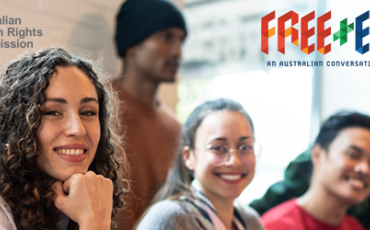Free and equal: An Australian conversation on human rights (2019)

Introduction
On 14 December 2018, I announced that the Australian Human Rights Commission would conduct a national conversation on human rights in 2019.[1] The national conversation asks: What makes an effective system of human rights protection for 21st century Australia?
We all want to live in a society that is fair and where everyone has the opportunity to thrive.
Human rights have a role to play in achieving this.
Human rights can assist us to define what government and the community should be doing to ensure that everyone has equal chances in life.
A range of factors have an impact on the opportunities that people will have throughout their lifetime— for example, due to a lack of services outside major urban and regional centres, systemic or institutional barriers, or the impact of inter-generational poverty.
The purpose of a national conversation on human rights is to develop a roadmap that will guide government action and community partnerships to fully realise human rights and advance equality.
This requires a mixture of actions being taken by government and the community to respect, protect and fulfil human rights.
We should be ambitious in setting targets to address inequality where it exists. We need to reimagine our system of protections of human rights so that we can provide everyone with the opportunity to be the best that they can be.
Everyone has a role to play in this process. Human rights are best protected and promoted by all—they are not just the responsibility of government.
I want to see conversation about how the promotion of human rights is a shared endeavour—by government, business, the NGO sector, educators, service providers and the community at large.
This also necessitates focusing on building ‘rights-mindedness’ and a rights culture in the community.
Eleanor Roosevelt once famously commented on the Universal Declaration of Human Rights that such documents ‘carry no weight unless the people know them, unless the people understand them, unless the people demand that they be lived’. Education and awareness raising about human rights is therefore critical.
By the end of 2019 the Commission intends to:
- recommend an agenda for federal law reform to protect human rights and freedoms fully
- recommend priorities for reforming federal discrimination law to make it more effective, comprehensive and fairer in its protection, and simpler to understand
- articulate key actions that all governments must take to adequately protect the human rights and freedoms of all Australians
- identify how we can build community understanding and partnerships to realise human rights and freedoms
- identify options to invest in and build community capacity to realise human rights and freedoms.
We face many challenges as a community. The public’s faith in our democratic processes have been challenged in recent years. Royal commissions into the institutional abuse of children and our banking system, for example, have uncovered concerning practices of some of the key institutions across our society.
A commitment to human rights for everyone—to advance Australia fair—enables us to confirm the common values and bonds we possess across our society, and to contribute to a brighter future for our children’s children.
That is a conversation worth having!
Emeritus Professor Rosalind Croucher AM
President
[1] The project has formal terms of reference that are available online at: https://www.humanrights.gov.au/our-work/rights-and-freedoms/projects/free-and-equal-dignity-and-rights-national-conversation-human.


![Mr Nauroze Anees v Commonwealth of Australia (Department of Home Affairs) [2019] AusHRC 133](/sites/default/files/styles/news_thumbnail/public/2020-03/2019_AusHRC_133_Redacted-_500px.jpg?itok=C7Xp7ads)